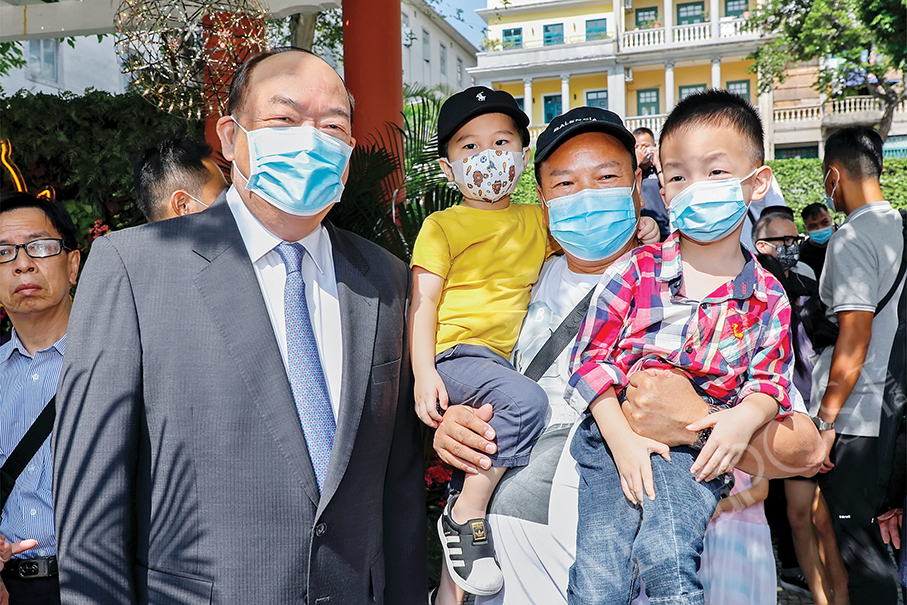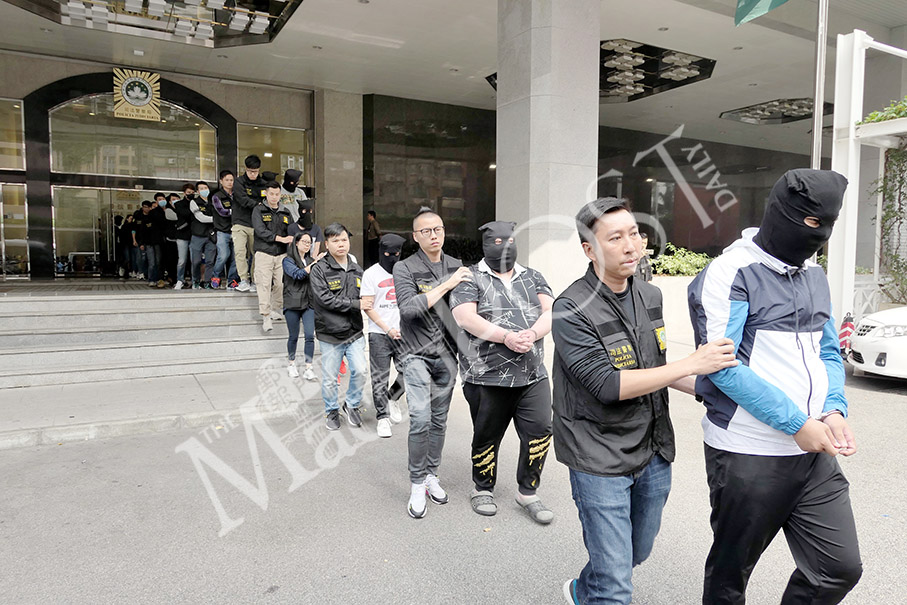Chief Executive Ho Iat Seng has reassured residents that his government will continue with its annual 10,000-pataca cash handout next year.
However, Ho also said that the government has decided not to raise the amount of its annual “wealth-sharing” handout in 2021 as the ongoing COVID-19 pandemic has placed it “under financial strain”.
Ho made the remarks while speaking to reporters on Saturday morning at Government Headquarters where he welcomed visitors to the building’s annual two-day Open Day, which ended yesterday.
In the wake of the seriously adverse impact of the COVID-19 pandemic on the local economy and the government’s financial straits, the chief executive has been asked by the media on several occasions since early this year whether the government’s annual cash handout would continue next year.
Ho told reporters in June he “hoped” that the annual cash handout could continue next year, provided that it would not be too controversial, considering that it has become part of the government’s regular spending on residents’ welfare and of many grassroots households’ annual spending plan.
However, Ho told reporters early this month that the government was still studying the possible continuation of its “wealth-sharing” handout scheme, and would announce its decision on the matter in his 2021 Policy Address, which he is slated to deliver next month.
In his meeting with senior members of the influential Macau Federation of Trade Unions (commonly known as Gung Luen – its name in Cantonese) last Monday, Ho said that the government would continue its various welfare benefits for residents, including the annual cash handout. However, Ho was quick to add that since it was “impossible” for the local government to predict the latest development of the COVID-19 pandemic, it would need to study how its “wealth-sharing” handout scheme could stimulate the local economy and consumption and stabilise the employment of staff in local micro-, small- and medium-sized enterprises (MSMEs), which represent 40 percent of Macau’s employed population.
Speaking to reporters on Saturday, Ho reaffirmed that the government’s annual cash handout would continue next year. Ho reassured the public that the government would not reduce next year’s amount of the handout, but neither would the government raise the amount, as it was “under a bit of a financial strain” amid the ongoing COVID-19 pandemic.
When asked by the media whether the government would possibly change its way of sharing the city’s wealth with residents next year, Ho said that the government would constantly study the matter after listening to various views from civil society. But Ho was quick to add that “if everybody prefers cash, [the government] will continue [sharing the city’s wealth] in cash [next year]”.
“The government does not intend to create something new that could get itself in trouble. Instead, it merely hopes that the cash handout will help boost the local economy,” Ho said.
The cash handout has been paid out by the government annually since 2008, when each permanent resident received 5,000 patacas while each non-permanent resident received 3,000 patacas. Since then, the amount has been gradually raised, before it was raised to 10,000 patacas for permanent residents and 6,000 patacas for non-permanent residents last year.
This year’s amount of the handout – which was paid to residents earlier this year – remained unchanged at 10,000 patacas for permanent residents and 6,000 patacas for non-permanent residents.
Possible extra financial support
Meanwhile, Ho also said that the government would “cautiously” consider rolling out the third round of financial support measures for residents and businesses in line with next year’s performance of the local economy.
“[For the time being] I cannot say yes or no. If the local economy improves next year, why would the government still have to roll out additional financial support measures? If next year’s economy continues to be very bad, the government will have no choice but to support residents. This matter is what the government will have to assess,” Ho said.
Ho’s remarks about the possible extra financial support measures on Saturday came after he told reporters early this month that the local government should not waste money to roll out the third round of financial support measures as the issuing of Individual Visit Scheme (IVS) tour permits for all mainlanders to travel to Macau had resumed late last month.
Ho also reassured the public that the Macau Special Administrative Region’s financial reserves of over 600 billion patacas would enable Macau to get through difficult times for many years. But Ho was quick to add that it would not be good to “live off the fat of the land”. Ho said that while there was no reason for the government not to support residents if they encounter financial difficulties, everybody would have to think about how to ensure that residents are supported financially in a more accurate way.
Xi’s acknowledgement
Meanwhile, Ho also said that when he attended last Wednesday’s ceremony to mark the 40th anniversary of Shenzhen as a special economic zone (SEZ) there, President Xi Jinping told him that he acknowledges Macau’s achievements in its COVID-19 prevention and control work. Xi urged the Macau government to continue its strict COVID-19 prevention work to ensure that there is not a new wave of COVID-19 in the MSAR, considering the still ongoing COVID-19 pandemic.
Ruling out travel bubble
Meanwhile, Ho also underlined that for the time being the Macau government will not discuss with any countries and regions the possible setting-up of travel bubbles. Ho’s remarks on the matter came after Hong Kong and Singapore agreed last week to set up a travel bubble so that residents can fly between the two places without having to be quarantined.
Ho underlined that the COVID-19 pandemic is still serious, pointing out that many European countries had recently to re-impose strict COVID-19 control measures, adding that allowing visitors from foreign countries to enter Macau would put great pressure on the city’s COVID-19 prevention work.
Ho said that to ensure Macau residents’ health and safety, the local government would have to “cautiously” consider the travel bubble matter.
Observers have noted that Macau has created a quasi-travel bubble with the mainland after the latter lifted its 14-day quarantine requirement for all arrivals from Macau in August.
Meanwhile, Ho also said that the possible relaxation of the validity of a nucleic acid test (NAT) certificate issued to those travelling between Macau and the mainland from the current seven days to 14 days would need a “very cautious and careful” study, particularly considering that Qingdao and Guangzhou have both recently confirmed new local COVID-19 cases.
Ho said that a seven-day validity has been justified scientifically, while there are no scientific grounds to endorse a 14-day validity. Ho said that a 14-day validity of NAT certificates for travellers would only be feasible after the National Health Commission (NHC) determines that it is justified scientifically.

Chief Executive Ho Iat Seng (left) poses with a father and his two sons who were among visitors to Government Headquarters on Saturday, the first day of the historical building’s annual two-day Open Day. Photo: GCS







